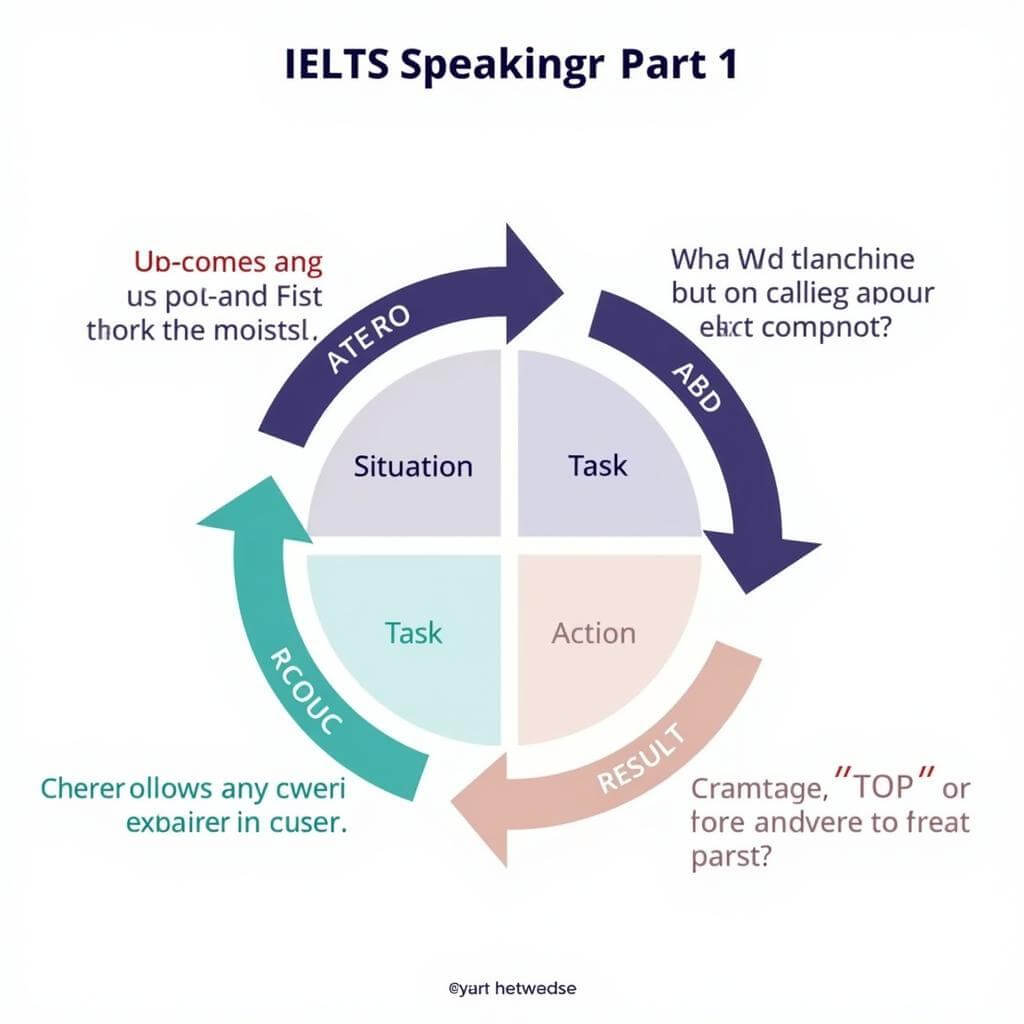IELTS Speaking Part 1 can be intimidating, but with the right approach, it’s an excellent opportunity to showcase your English skills. This article will guide you through effective strategies for practicing for part 1 with everyday topics, helping you build confidence and improve your performance.
Understanding the Nature of IELTS Speaking Part 1
IELTS Speaking Part 1 is designed to put candidates at ease by discussing familiar topics. It’s crucial to recognize the types of questions typically asked and how to approach them confidently.
Common Everyday Topics in Part 1
- Family and friends
- Work or studies
- Hobbies and interests
- Daily routines
- Home and accommodation
- Hometown and local area
Understanding these topics allows you to prepare more effectively and feel more comfortable during the exam.
Strategies for Effective Practice
To excel in Part 1, consistent practice with everyday topics is key. Here are some strategies to enhance your preparation:
-
Create a topic list: Compile a list of common Part 1 topics and brainstorm potential questions for each.
-
Develop answer templates: Craft flexible response structures that you can adapt to various questions.
-
Record yourself: Use your smartphone to record practice sessions and identify areas for improvement.
-
Time your responses: Aim for 2-3 sentence answers lasting about 30 seconds each.
-
Practice with a study partner: Simulate the exam experience by taking turns asking and answering questions.
Techniques for Answering Part 1 Questions
Mastering these techniques will help you provide engaging and natural responses:
Be Concise yet Informative
While it’s important to provide sufficient information, avoid overly lengthy answers. Strike a balance between being informative and concise.
“Remember, Part 1 is about warming up and demonstrating your ability to communicate effectively on everyday topics. Keep your answers brief but substantive,” advises Dr. Emma Thompson, IELTS examiner with 15 years of experience.
Use Natural Language and Expressions
Incorporate everyday expressions and idioms to make your responses sound more natural. For example:
- “I’m really into…” (when discussing hobbies)
- “It’s not my cup of tea” (when talking about dislikes)
- “I’m a night owl” (when describing sleep habits)
Extend Your Answers Appropriately
While keeping answers concise, look for opportunities to extend them naturally. Use the STAR method:
- Situation: Briefly describe the context
- Task: Explain what was required
- Action: Describe what you did
- Result: Share the outcome
This approach helps you provide comprehensive answers without rambling.

Improving Vocabulary for Everyday Topics
A rich vocabulary is crucial for expressing yourself effectively in Part 1. Here’s how to enhance your lexical resource:
- Create topic-specific word banks
- Learn synonyms for common adjectives
- Practice using descriptive language
- Incorporate idiomatic expressions naturally
Remember to use vocabulary that you’re comfortable with to avoid stumbling during the exam.
Handling Nerves and Building Confidence
Nervousness is common, but there are ways to manage it:
- Practice deep breathing exercises before and during the exam
- Visualize successful interactions
- Prepare thoroughly to boost your confidence
- Remember that the examiner is there to help, not to trick you
“Confidence comes from preparation. The more you practice with everyday topics, the more natural your responses will become,” says Mark Johnson, IELTS preparation coach.
Common Pitfalls to Avoid
Be aware of these common mistakes when practicing for Part 1:
- Over-rehearsing set responses
- Giving one-word answers
- Veering off-topic
- Speaking too quickly or slowly
- Using overly formal language
Avoiding these pitfalls will help you sound more natural and engaged during the exam.
Integrating Grammar Practice into Everyday Topics
While Part 1 focuses on familiar subjects, it’s an excellent opportunity to showcase your grammar skills. How to use grammar in everyday practice can significantly boost your performance. Focus on:
- Using a variety of tenses appropriately
- Incorporating conditionals when discussing hypothetical situations
- Demonstrating command of comparative and superlative forms
Expanding Your Range with Abstract Topics
As you become more comfortable with everyday topics, challenge yourself by handling abstract topics in part 3 confidently. This will help you develop flexibility in your language use and prepare you for the more complex discussions in later parts of the speaking test.
Conclusion
Practicing for IELTS Speaking Part 1 with everyday topics is fundamental to achieving a high score. By following these tips and strategies, you’ll be well-prepared to tackle this section of the exam with confidence. Remember, the key is consistent practice and a positive attitude. Keep refining your skills, and you’ll see improvement in no time.
Frequently Asked Questions
-
How long should my answers be in IELTS Speaking Part 1?
Aim for answers that are 2-3 sentences long, lasting about 30 seconds each. -
Can I ask the examiner to repeat the question if I don’t understand?
Yes, you can politely ask the examiner to repeat or clarify the question. -
Is it okay to use informal language in Part 1?
Yes, using natural, conversational language is encouraged, as long as it’s appropriate. -
How can I improve my fluency for everyday topics?
Regular practice, recording yourself, and having conversations in English about daily life can significantly improve your fluency. -
What if I can’t think of an answer to a question?
It’s okay to take a moment to think. You can use phrases like “Let me think about that for a second” to buy time. -
Should I memorize answers for common topics?
While it’s good to prepare, avoid memorizing full answers. Instead, focus on flexible templates and key vocabulary. -
How important is pronunciation in Part 1?
Clear pronunciation is important throughout the test. Focus on being understandable rather than having a perfect accent.